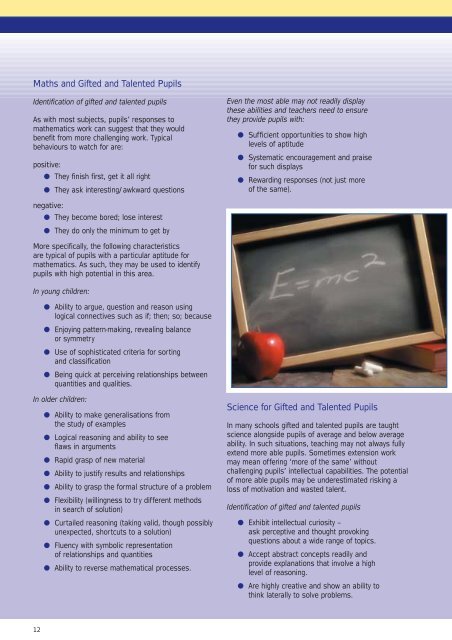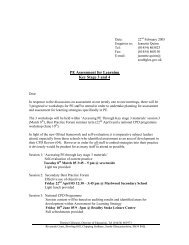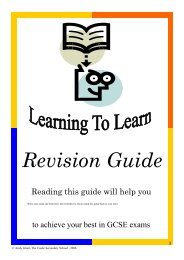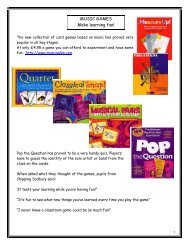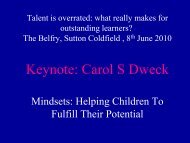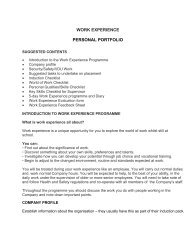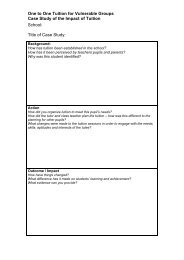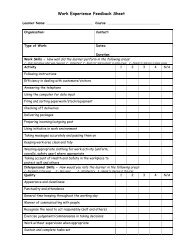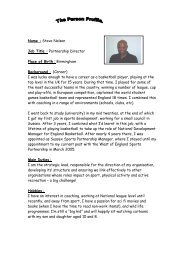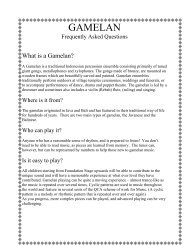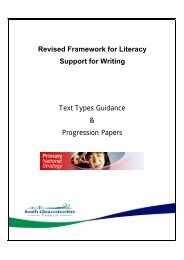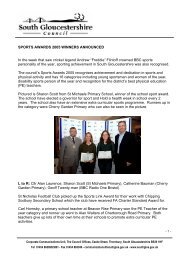Gifted & Talented Pupils
Gifted & Talented Pupils
Gifted & Talented Pupils
Create successful ePaper yourself
Turn your PDF publications into a flip-book with our unique Google optimized e-Paper software.
Maths and <strong>Gifted</strong> and <strong>Talented</strong> <strong>Pupils</strong><br />
Identification of gifted and talented pupils<br />
As with most subjects, pupils’ responses to<br />
mathematics work can suggest that they would<br />
benefit from more challenging work. Typical<br />
behaviours to watch for are:<br />
positive:<br />
● They finish first, get it all right<br />
● They ask interesting/awkward questions<br />
Even the most able may not readily display<br />
these abilities and teachers need to ensure<br />
they provide pupils with:<br />
● Sufficient opportunities to show high<br />
levels of aptitude<br />
● Systematic encouragement and praise<br />
for such displays<br />
● Rewarding responses (not just more<br />
of the same).<br />
negative:<br />
● They become bored; lose interest<br />
● They do only the minimum to get by<br />
More specifically, the following characteristics<br />
are typical of pupils with a particular aptitude for<br />
mathematics. As such, they may be used to identify<br />
pupils with high potential in this area.<br />
In young children:<br />
● Ability to argue, question and reason using<br />
logical connectives such as if; then; so; because<br />
● Enjoying pattern-making, revealing balance<br />
or symmetry<br />
● Use of sophisticated criteria for sorting<br />
and classification<br />
● Being quick at perceiving relationships between<br />
quantities and qualities.<br />
In older children:<br />
● Ability to make generalisations from<br />
the study of examples<br />
● Logical reasoning and ability to see<br />
flaws in arguments<br />
● Rapid grasp of new material<br />
● Ability to justify results and relationships<br />
● Ability to grasp the formal structure of a problem<br />
● Flexibility (willingness to try different methods<br />
in search of solution)<br />
● Curtailed reasoning (taking valid, though possibly<br />
unexpected, shortcuts to a solution)<br />
● Fluency with symbolic representation<br />
of relationships and quantities<br />
● Ability to reverse mathematical processes.<br />
Science for <strong>Gifted</strong> and <strong>Talented</strong> <strong>Pupils</strong><br />
In many schools gifted and talented pupils are taught<br />
science alongside pupils of average and below average<br />
ability. In such situations, teaching may not always fully<br />
extend more able pupils. Sometimes extension work<br />
may mean offering ‘more of the same’ without<br />
challenging pupils’ intellectual capabilities. The potential<br />
of more able pupils may be underestimated risking a<br />
loss of motivation and wasted talent.<br />
Identification of gifted and talented pupils<br />
● Exhibit intellectual curiosity –<br />
ask perceptive and thought provoking<br />
questions about a wide range of topics.<br />
● Accept abstract concepts readily and<br />
provide explanations that involve a high<br />
level of reasoning.<br />
● Are highly creative and show an ability to<br />
think laterally to solve problems.<br />
12


